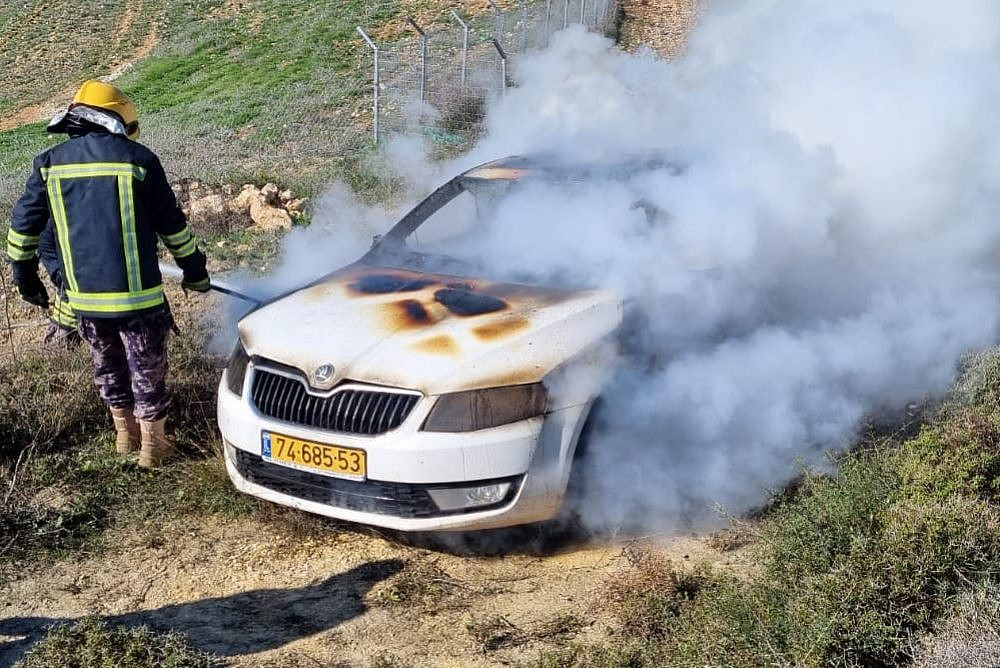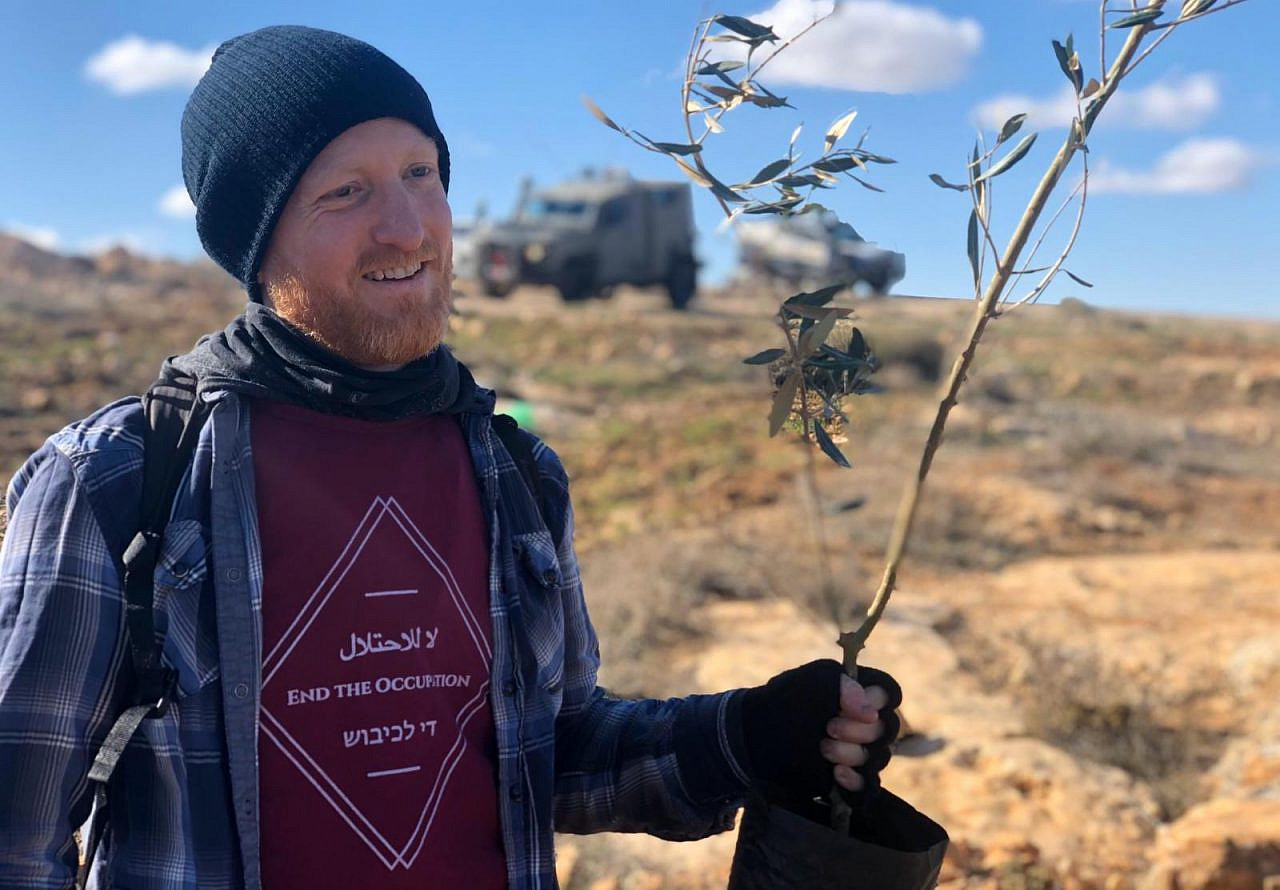A Brief Colonial History Of Ceylon(SriLanka)
Sri Lanka: One Island Two Nations
A Brief Colonial History Of Ceylon(SriLanka)
Sri Lanka: One Island Two Nations
(Full Story)
Search This Blog
Back to 500BC.
==========================
Thiranjala Weerasinghe sj.- One Island Two Nations
?????????????????????????????????????????????????Monday, January 31, 2022
Germany: New website to inform journalists about their employer protections

Credits: Andrea Piacquadio via Pexels
Journalists in Germany can now find out whether their employers or clients have joined the code of conduct to better protect journalists via the website Schutzkodex. The European Federation of Journalists (EFJ) joins its German affiliates, the German Journalists Association (DJV) and the German Journalists Union (dju in ver.di), in welcoming this further development of the initiative to better protect journalists.
Violence against media workers is increasing in Germany as well as throughout Europe, whether it be hate speech, (online) threats or physical attacks in the streets. This strongly imperils journalists and press freedom in general. Consequently, if more and more journalists turn their backs to such dangerous work environments, freedom of information is endangered. “Therefore, it is all the more important that media houses acknowledge their responsibility”, said Frank Überall, DJV chair.
Against this backdrop, in spring 2021, an alliance of journalists’ organisations, media unions and advisory institutions launched the protection code. Media companies signing up to the code declare their willingness to implement important standards to protect their employees and freelancers. The code includes a number of practical measures, such as permanent contact persons at the employing organisation as well as psychological, legal and financial support for those affected in the event of verbal or physical violence including their families.
“Media companies have to fulfill their duty of care for their permanent and freelance workers, who now carry out their work at great risk to themselves and their families. The best way to do this is to join the protection code and implement it consistently,” said Monique Hofmann, the General Secretary of dju in ver.di.-------------------------
Now, journalists can easily check whether their employer or client already joined the code of conduct. At the moment, the media outlets SPIEGEL, ZEIT, ZEIT ONLINE, Frankfurter Rundschau, dpa, Süddeutsche Zeitung, taz and Südwestdeutsche Medienholding have joined the initiative. Media houses can easily follow via the website.
The new website also offers online get-togethers for small groups of affected journalists in a safe space. The next meeting will take place on 22 March 2022 and registrations are open.
Renate Schroeder, EFJ Director said: “This is a good practice hopefully to be followed by other affiliates throughout Europe. Now it is up to German media houses to join this important code of conduct and show they mean it seriously with protecting their staff. It is indeed high time!”
In 2021, the Media Freedom Rapid Response mechanism monitored 119 attacks against press workers and media in Germany, a strong increase compared to the previous two years. The number of unreported cases is expected to be much higher.
Palestinian prisoners have commenced a boycott of Israeli courts
![Moammar Nakhleh, the father of 17 year-old Palestinian prisoner Amal, shows a photograph of his son on his telephone, in Jalazun refugee camp, near the occupied West Bank city of Ramallah, on 8 January 2022. [ABBAS MOMANI/AFP via Getty Images]](https://i0.wp.com/www.middleeastmonitor.com/wp-content/uploads/2022/01/GettyImages-1237616479.jpg?resize=1200%2C800&quality=85&strip=all&zoom=1&ssl=1)
Moammar Nakhleh, the father of 17 year-old Palestinian prisoner Amal, shows a photograph of his son on his telephone, in Jalazun refugee camp, near the occupied West Bank city of Ramallah, on 8 January 2022. [ABBAS MOMANI/AFP via Getty Images]
The latest episode of European Union hypocrisy over Palestine came to light this week with the case of Amal Nakhleh.
Nakhleh is a Palestinian teen who was still a child – 17 years of age – when he was first arrested in January of last year.
Like hundreds of other Palestinians, Nakleh has been cast into Israeli dungeons without charge or trial. This is a practice which Israel whitewashes as "administrative detention." In fact, it is the most arbitrary form of indefinite military internment possible, with no due process and no recourse.
The EU (as well as the government of Ireland) has – unusually – called for Nakleh's release. But they have only done so because Nakleh has an autoimmune disease which prevents him from being vaccinated against Covid-19 – which he has now contracted in Israeli prison, seriously threatening his health.
In other words, the EU has only called for his release because they are able to portray him as the exception to the rule. But in fact, all Palestinian prisoners held by Israel are by definition political prisoners.
READ: Palestinians don't need Israel investigated, they need justice
The administrative detainees are just the most egregious examples. They are held on the basis of supposed "secret evidence" which the Shin Bet – Israel's secret police force – claims to have in its possession. The have no charges, no trials and their detention orders can be indefinitely renewed.
Even when – after much struggle, usually including gruelling hunger strikes – "administrative detainees" manage to get released from Israeli dungeons, Israeli army thugs have a frequent habit of re-arresting the prisoners soon after – if not immediately after.
Israel, supposedly "the only democracy in the Middle East" is in fact the only country in the world that routinely subjects children to military tribunals. And it does so on a purely racist basis – only to Palestinian children, and never to Jewish children.
The truth is that Israel is an apartheid military dictatorship and not a democracy.
For all these reasons, the Palestinian administrative detainees at the start of this month commenced a boycott of Israel's military courts system.
READ: The war for Israel on British campuses
It's a new tactic, and it will be interesting to see how successful it will be. According to Addameer, the Palestinian human rights group which focuses on the prisoners, "The comprehensive boycott includes Israeli military courts at all levels, including courts of first instance, appellate courts, and the Israeli civil High Court. Accordingly, Palestinian administrative detainees refuse to participate in court procedures and hearings; their legal counsel will no longer attend or participate in the court procedures on their behalf."
Of course, Amal Nakhleh should be immediately released. But so too should all the other Palestinian prisoners arbitrarily detained and imprisoned by Israel.
Israel is a racist apartheid state, not a democracy. Even Palestinians who are charged and received trials are subjected to the military courts system alone – which, again, is for Palestinians only and not for Jews.
The military courts are kangaroo courts with a 99.7 per cent conviction rate. This is not justice.
Free them all!
The purpose of settler terrorism
This article originally appeared in “The Landline,” +972’s weekly newsletter. Subscribe here.
By Edo KonradJanuary 28, 2022
On the morning of Friday, Jan. 21, a group of mostly Jewish Israelis drove up to the village of Burin in the northern West Bank to accompany farmers as they planted olive trees. The action, which was led by the Olive Harvest Coalition (whose members help protect Palestinian farmers) and Rabbis for Human Rights, is a fairly common occurrence in the occupied territories. This is particularly true in Area C, under full Israeli military and administrative control, where Palestinians routinely face both settler and army violence.
Just over an hour after the volunteers began planting, settlers from the nearby outpost of Givat Ronen, which was built illegally even according to Israeli law, came down and began attacking the activists, sending at least eight to the hospital.
Public Security Minister Omer Barlev denounced the incident, which was partially captured on video, as a “terrorist attack.” Yet despite the unusually severe language from an Israeli official, a week later, not a single perpetrator has been caught.
The violent episode was only the first in a string of settler attacks last weekend. During the weekly protest against expulsions in Sheikh Jarrah, a well-known right-wing activist pepper-sprayed demonstrators, and another right winger pulled what was likely a pepper spray pistol on the protesters. The following day, settlers from the notoriously violent Havat Ma’on outpost in the South Hebron Hills entered Palestinian agricultural areas in the village of A-Tuwani, and later threw stones and threatened Palestinian farmers and left-wing activists. On Jan. 24, settlers threw stones at Palestinians and Palestinian-owned businesses in the town of Huwara just south of Nablus, during celebrations marking the release from prison of a settler who had been convicted of assaulting Palestinians last year. At least three Palestinians were wounded in the attack.
These assaults are merely a blip in a year that has seen an increase in settler attacks on Palestinians in an attempt to drive them off their land. Over the past year, +972 and Local Call have uncovered a number of cases in which settlers and soldiers worked in tandem to kill Palestinians across the West Bank.
For this week’s newsletter, I spoke to Daniel Roth, a co-founder of Solidarity of Nations — Achvat Amim, a movement-building platform that directly engages with the reality on the ground in Israel-Palestine, and one of the activists who was in Burin that day (and who was wounded by a rock thrown at him by a settler). We talked about what he witnessed, the purpose of settler violence, and what activists can and should be doing to protect themselves.
This interview has been edited for length and clarity.
Tell me about what happened that day in Burin.
We headed up to the village that morning with the idea to plant olive trees with some of the farmers there. The particular plot we were on was on the edge of the town, up on the hill, directly under the settler outpost of Givat Ronen, just east of Burin. Four years ago, the Palestinian owner of the plot was threatened by the outpost security guard, and was told that if he dared work the land they would “get him.” Because the farmer had not been cultivating the land for years, he thought this would be an opportunity to try and go back to it. This threat was hovering over the farmer for years, and of course, the settler-terrorists made good on their threat and came down to attack us.
Daniel Roth. (Natasha Westheimer)
We were just finishing up planting around 50 trees on that particular plot. We looked up and there were between 15-25 settlers running down with their faces covered, carrying large stones, clubs, and a canister of gasoline. They immediately went for the two cars, which belonged to the volunteers, and began smashing the windows. One of the cars was full of volunteers who managed to escape. As for the other car, the owner was near it when a settler poured gas all over the outside and inside before setting it on fire. As the car burned, the settlers immediately turned their attention to whomever was within reach. They began pummeling the volunteers with clubs, throwing rocks at people’s faces — including mine — and hitting people over the head, which sent at least eight people to the hospital. The person who organized the action remained in the hospital for 48 hours after getting surgery on his hand.
At some point, the settlers ran up the hill and disappeared. The first people to arrive on the scene were actually Palestinian firefighters who came and put out the burning car and removed people from the vicinity, since the vehicle was beginning to explode. The Israeli army showed up some time after, and looked at a couple of head wounds.
Did the activists file a complaint against the settlers?
A few, including myself, lodged complaints.
Have any of the settlers been arrested or taken in for questioning?
Not that I know of. On Wednesday night, a few settlers from Givat Ronen attacked a Border Police officer and slashed the tires of his vehicle. This happened after the army announced it would demolish a few structures in the outpost following the settler attack.
What was going through your mind as the attack was taking place?
It’s hard to remember exactly what is going on in your head when you’re under attack, and it’s not the first time I’ve been attacked by settlers. Looking back, part of me was worried about making sure that people were out of reach from the settler-terrorists. When I saw someone who was immobile, I went over to be with them.
I’ve watched the video I filmed over and over and over again to see what it is I saw in the moment. There is this particular moment where you see the settler pouring gasoline over the car as if it’s nothing. At some point the owner of the car, who is clearly older, goes over to try and either reason with the settler or protect his car. The settler, without thought or apprehension, just swings his club straight into the head of the car owner. This could have killed him.
I keep looking at that moment. It takes me back to the feeling of being surrounded by violent people with whom one cannot reason. It’s a frightening feeling.
Can you place this particular attack in the wider context of settler violence?
Settler violence is increasing, both in my experience and statistically. It’s important to pause and say that for Palestinians, this violence a daily reality. The people who were hurt in this particular attack happened to be Israeli Jews, which is why it got the media attention that it did. Palestinians experience this kind of violence day in and day out in the occupied territories, both from settlers and the army. It’s systemic top to bottom.
So while it was particularly horrific for me to experience, this attack was part of a larger system that operates to keep Palestinians living under fear of violence.
How should we understand the function of settler violence as part of Israeli rule over the occupied territories?
First of all, it’s not only settlers who are acting violently. The overall aim is to force Palestinians out of their homes, particularly in Area C, and out of the country completely, or at the very least into the Bantustans of Area A [under Palestinian Authority rule] to further limit where they can go or their access to resources. This is all part of the larger, ongoing policy of taking over maximum land for Israel and limiting as much as possible the number of Palestinians on that land. That’s the overarching policy, and it’s the platform upon which settler violence exists.
I try to keep in mind that both of these things are true: that this is the daily reality for Palestinians living under occupation and apartheid, and that this particular attack was horrific for me and everyone who went through it. I don’t think any of us — Jewish volunteers or Palestinians from Burin — will soon forget it.
What is the role of the army and the police when these settler attacks occur?
Most commonly, the army acts as something between an enforcer and an enabler during settler attacks. Their default is to believe the settlers. Videos from the South Hebron Hills show soldiers playing on their phones as settlers attack Palestinians. I personally have seen police officers look on as settlers committed arson on a cave [in which Palestinians live] in the South Hebron Hills. Sometimes you might run into a commander who is a bit more thoughtful or wants to keep things calm on that particular day, but the occupation does not run on the rule of law. It is a military dictatorship.
Is there training that activists undergo before they go out into the field about how to deal with violence by settlers or the army?
There is, but there needs to be much more training and it needs to be much more widespread. First of all, people should know their rights when they’re facing the Israeli authorities.
On a tactical, strategic, ideological level, it is important for people engaged in this work to fully understand the thinking behind nonviolence resistance and why to use it. There are many people who would say, “Well why don’t you just hit the settlers back?” or “Of course you had to stay in the field — you had to protect the trees.” What they don’t realize is that the power structure as it is set up right now does not allow us to protect the trees. You can’t protect the trees as long as the occupation exists. You need to plant them knowing they may be uprooted the next day, because that’s what the Palestinian farmers you’re accompanying are asking for. You have to know that you might have to protect yourself in the moment by hitting back, but what that’s actually going to do is bring the full power of the state down on the Palestinians you’re standing with — not on you.
One thing that drives me is the idea that we’re engaged in this movement because the future that we see is one of equality and justice and self-determination for everybody. The future the people out there trying to hurt believe in is a future for them and them only. That is why it is so deeply important to understand the ideological, strategic, and tactical aspects of what nonviolent resistance means, and what it means to build a movement in solidarity with people living under this regime.
WATCH: Dozens of Jewish Settlers Break into Al-Aqsa
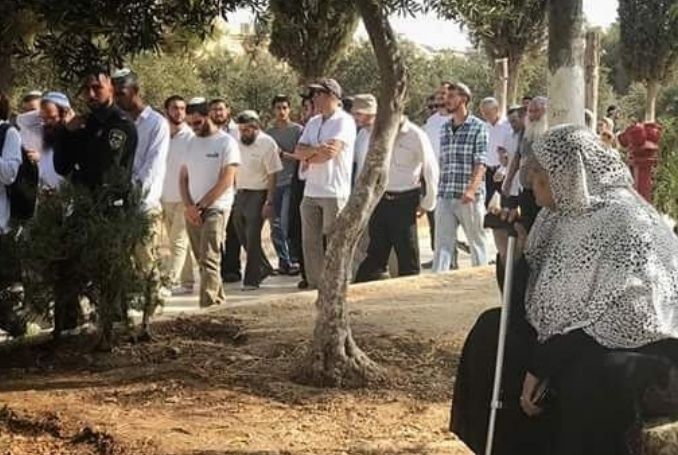
Illegal Jewish settlers storming Al-Aqsa Mosque compound. (Photo: via Twitter)
January 30, 2022
Dozens of Jewish settlers, heavily guarded by Israeli police, broke into the Al-Aqsa Mosque compound in occupied Jerusalem on Sunday, and performed rituals throughout its courtyards, the official Palestinian news agency WAFA reported.
The Jordan-run Islamic Waqf, in charge of the holy site, said scores of Jewish settlers broke into the compound through the Moroccan Gate, where they performed Talmudic prayers and other rituals.
Located in occupied Jerusalem, the Al-Aqsa Mosque is the third holiest site for Muslims.
Jerusalem’s Islamic Waqf has repeatedly described the settlers’ tours as “provocative”, and said that Palestinian worshippers and guards at Al-Aqsa feel uncomfortable with the presence of Israeli police and settlers touring the Muslim holy site.
Israel occupied East Jerusalem, where Al-Aqsa Mosque is located, during the Six-Day War in 1967 in a move never recognized by the international community.
The role of the JNF in greenwashing Israeli settler-colonialism
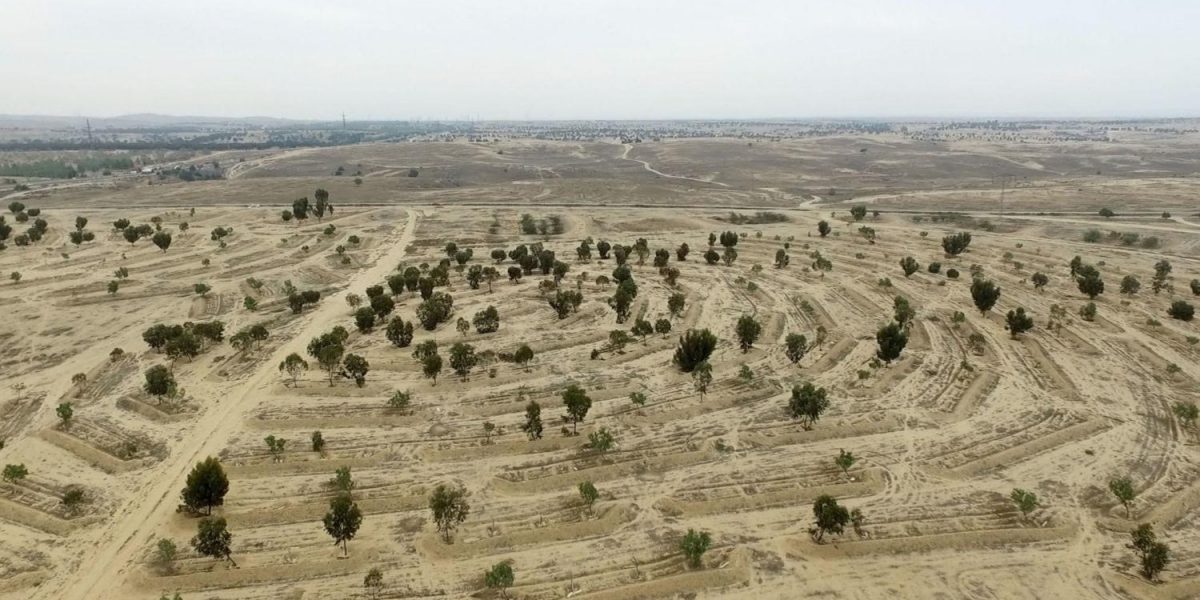
In Palestine, settler-colonialism often appears overt and explicit, as with the demolition and ethnic cleansing of Palestinian towns and neighborhoods like Sheikh Jarrah and Silwan. At the same time, Israel deploys more subtle, sinister forms of erasure, attempting to replace the culture and geography of Palestine with a reimagined Zionist “homeland” so that even the land itself becomes physically unrecognizable to its Indigenous inhabitants. The Israeli state practice of destroying Indigenous flora and fauna and replacing them with foreign specimens is one aspect of such greenwashing efforts.
Greenwashing refers to the ongoing practices of appealing to environmentalism, while maintaining acts of violence upon certain communities and peoples. The Israeli state and the Jewish National Fund (JNF) facilitate greenwashing efforts, uprooting and replacing endemic habitats across all of Occupied Palestine, and with a particular focus on Al-Naqab in recent months. The JNF’s influence in this regard cannot be underestimated: the organization owns and maintains 13 percent of all stolen Palestinian land. By planting trees atop Indigenous villages, uprooting endemic agriculture, and blocking Palestinians’ access to extremely scarce water sources, the JNF continues to play a key role in the uprooting and desecration of Palestinian land and livelihoods.
Trees as a colonial weapon
For years, the JNF has planted hundreds of pine trees across Palestine that are not Indigenous to the Levant. For example, after the Palestinian al-Tira village was completely demolished by Israeli occupation forces, the JNF planted hundreds of pine trees to conceal the dispossession of Palestinians and built the Carmel National Park in its place, which remains Israel’s largest national park. Non- indigenous pine trees were ill-suited to the natural Palestinian environment and have killed off many other native plants in their vicinity. The establishment of Israeli national parks began through uprooting the natural vegetation of olives and fruit trees. By planting pine trees, the JNF rendered Palestine’s natural environment highly vulnerable to ecocide and habitat destruction, as pine trees killed nearly all surrounding flora due to their high acidity level.
Canada Park, located in the West Bank, is another site designated as an Israeli national park that the JNF constructed only after the Zionist army demolished villages in the area. Once the land was cleared, the JNF replanted a recreational forest over the remains of Palestinian homes. In total, the JNF and Israeli state have uprooted more than 160,000 olive trees to build these artificial forests. The loss of so many olive trees is not only a tragic for their symbolic power as emblems of Palestinian culture and geography: it is also a devastating loss for Palestinian farmers, thousands of whom have had their main source of agriculture and income taken from them.
Agriculture
In Al-Naqab, Palestinian Bedouin houses are systematically destroyed at a fixed pace to provide increased access to land for Israeli agriculture. Palestinian Bedouins in Al-Naqab, who maintain the land for their livelihoods, have resisted ethnic cleansing for decades while simultaneously reckoning with their almost complete lack of a feasible local economy to sustain themselves as a result of the occupation. There are over 40 Palestinian Bedouin villages in Al-Naqab that are “unrecognized” by the settler state and as a result of their unincorporated status, are denied access to water, electricity, sewage, education, healthcare and roads.
In the past month Palestinian Bedouins in al-Naqab have been mounting resistance efforts to an accelerated campaign by the JNF to uproot and displace them from their homes. Protests in Al-Naqab have been ongoing for over 2 weeks and families in the villages are calling for a weekend of action on January 28 – January 30.
Charitable status
The JNF has charitable status in Canada and continues to operate despite the efforts of organizers to revoke its charitable status. The building of Canada Park was funded by JNF Canada and lies atop the ruins of three villages: Beit Nuba, Imwas, and Yalu. The villages of al-Araqeeb, Umm al-Hiran, and Silwan are all under immediate threat of being displaced by the JNF, despite ongoing resistance to forced expulsions and police raids.
Palestinian organizers globally are calling to revoke the charitable status of the JNF. There are ongoing calls to divest funds from the JNF to end its significant role in the ongoing ethnic cleansing of Palestinians. Join the call to action to #DefundtheJNF.
On Saturday, January 29, Tkaraonto/Toronto will hold a march in defense of Al-Naqab and in support of Palestinian resistance efforts to ongoing displacement and dispossession. The march will start at 2 PM from Yonge-Dundas Square to the Israeli Consulate. Come stand with Palestinians in our struggle against Zionist ethnic cleansing. Join us as we oppose greenwashing and take a stand against ongoing settler-colonialism in Palestine.
Dying fish and a dying trade: Fishermen lament Iraq's shrinking Lake Razzaza
Dead fish now litter the lake's shores as drought and neighbouring countries' dam projects devastate environment

Fisherman Bashir Kamel, pictured with his morning catch, estimates that the lake has shrunk as much as 40 percent from when he first started fishing here as a boy (MEE/Tom Westcott)
By Tom Westcott-30 January 2022
Lake Razzaza, also known as Lake Milh, emerges as a pure stretch of blue beside the desert road running from the shrine city of Karbala towards Iraq’s border with Saudi Arabia, but the lapping edges of its tranquil waters now wash up dead fish.
Among the brightly-painted boats resting on the shoreline, fisherman Bashir Kamel, 38, walks barefoot carrying crates of his still-flapping morning catch. He pours the fish into a polystyrene box lined with the ice blocks that will keep them fresh until they reach a marketplace in Karbala.
“It looks like there are a lot of fish, but there are very few now because the lake is shrinking,” he tells Middle East Eye. “Every year it gets smaller.”
Kamel estimates that the lake, lying 40km west of Karbala, has shrunk as much as 40 percent from when he first started fishing here as a boy, helping his father.
“The lake used to be fed by small tributaries from the Euphrates but these tributaries were cut and since 2003 no water has come to the lake, so the water has become saltier and the freshwater fish we catch can’t survive in this salty water,” he said.
“We used to have big fish here, and they still have those in the marshes. But here, they have vanished.”
Manmade Lake Razzaza is Iraq’s second-largest freshwater lake. It was completed in the 1970s to receive excess water from Habbaniya Lake during flood season via drainage canals.
Some of these were cut as part of former Iraqi president Saddam Hussein’s efforts to quell unrest in the predominantly Shia south by draining marshlands, but decreased Euphrates floodwaters have since caused other tributaries to run dry.
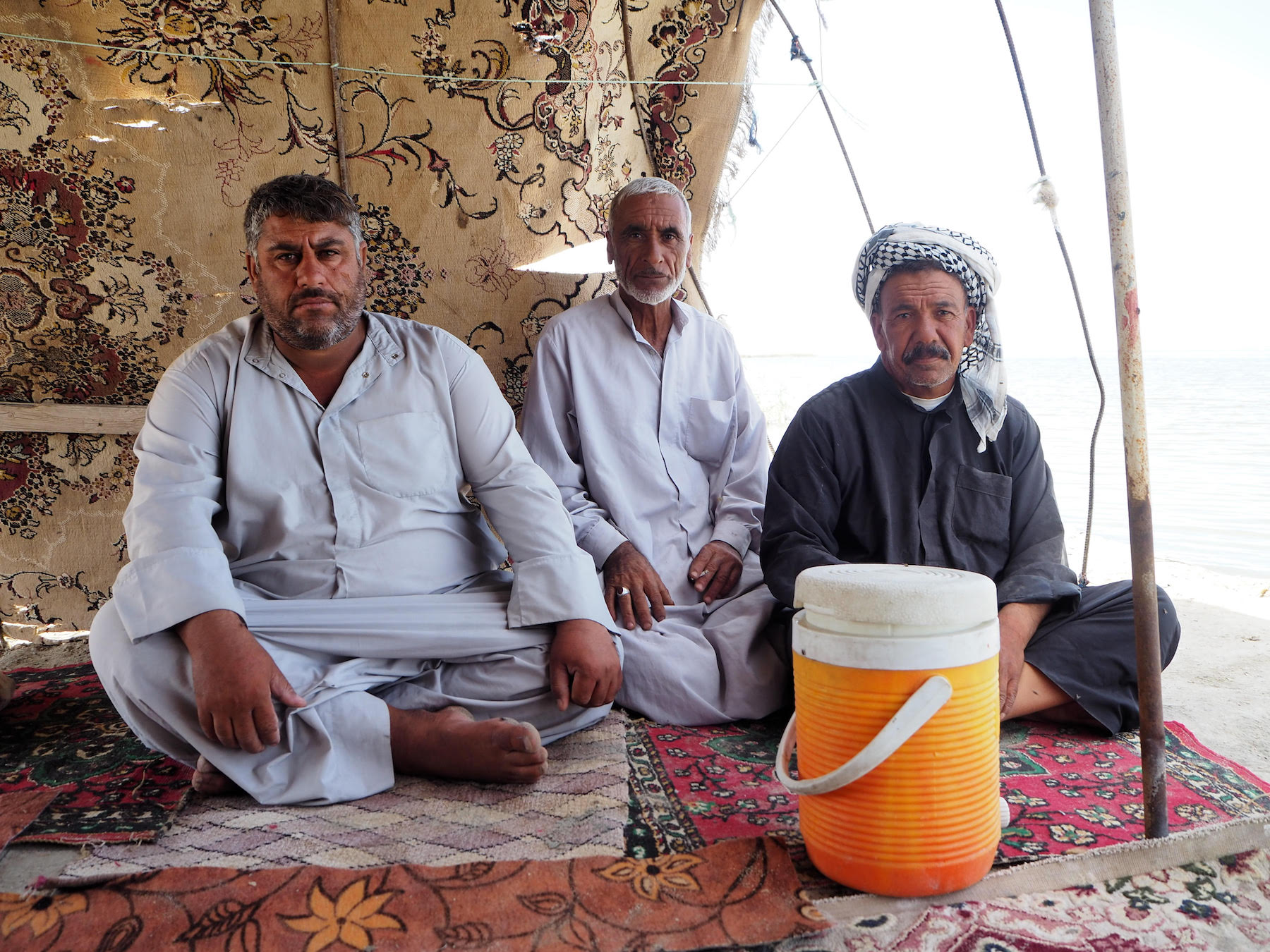
Moving rhythmically between the boat and boxes, carrying the crates, Kamel steps over the dead fish that line the shoreline.
“The dead fish were not sick, they are dying because the water is becoming saltier, which is also making their colour change,” he explains.
“In the winter, the fish can adapt to salty water but in our very hot summers, evaporation makes the water saltier.
"If no freshwater comes and the lake continues to become saltier, all the fish will die.”
Further along the shoreline, four fishermen shelter from the morning sun under a makeshift tent, made from old rugs and carpet scraps.
“The number of fish that are dying are now greater than the fish we are catching,” says 40-year-old Ali, gesturing towards the shoreline.
“The water was better before and there were diverse fish, but almost all the different kinds have gone. We just depend on one type of fish now, and they are smaller and weigh much less than before.”
It is not only the fish that are dying, but also local livelihoods passed down through several generations.
There used to be around 1,000 families relying on fishing in the area, but that number has now dropped to just 50, Ali tells MEE.
“A lot of fishermen gave up the work because they couldn’t support their households on the modest income to be made from this small number of fish.
"We inherited this trade from our fathers, but if no freshwater reaches the lake, our family trade will die out.”
Dams and droughts
The fishermen believe the lake’s shrinking waters are a result of upstream dam projects, especially in neighbouring Turkey, which opened its first dam on the Euphrates in 1974.
“Turkish dams, engineered to control the water flows, are the problem,” says Ali. “In Saddam’s time, Iraq and Turkey used to have deals - Saddam would give them oil and they would give us water - but now there are no such ‘give and take’ agreements, so they don’t give us water.”
A combination of ongoing upstream dam projects and sporadic droughts that reduce annual rainfall are impacting Lake Razzaza, according to Dr Aun Abdullah, consultant and acting spokesperson for Iraq’s Ministry of Water Resources.
“For many years we have not given freshwater to this area simply because we don’t have enough,” he told MEE.
“We can only release freshwater there when the Euphrates has high floods, but we don’t know when, or if, that will happen because the Euphrates has now changed from a ‘free river’ to a ‘controlled river’ after the building of many dams and reservoirs in Turkey.”
Turkey’s ongoing Southeastern Anatolia Project (GAP), which is set to feature 22 dams and reservoirs, 14 of which will be located on the Euphrates, looms as a future threat over downstream Iraq.
“Razzaza is in a bad condition because we don’t have enough water to give," said Abdullah. "We only pump some brackish water from one drainage area to maintain it as a small lake and support the surrounding environment, but this drainage area is very poor and dry.”
Such drainage water could be why Nasa footage indicated that, in 2020, the lake had partially recovered to a similar size as recorded in 2015. However, brackish water supplies do nothing to help the fishermen because they raise saline levels, which is what is killing the fish.
Vanishing wildlife
Lake Razzaza's fisherman also believe their plight is neglected by Iraq’s political echelons who, they claim, have little interest in supporting humble trades such as those of fishermen.
“Our situation is shameful,” an ageing fisherman who declined to give his name said, adding quietly: “please write about our distress.
"Perhaps our politicians will pay attention if our situation is reported by international media.”
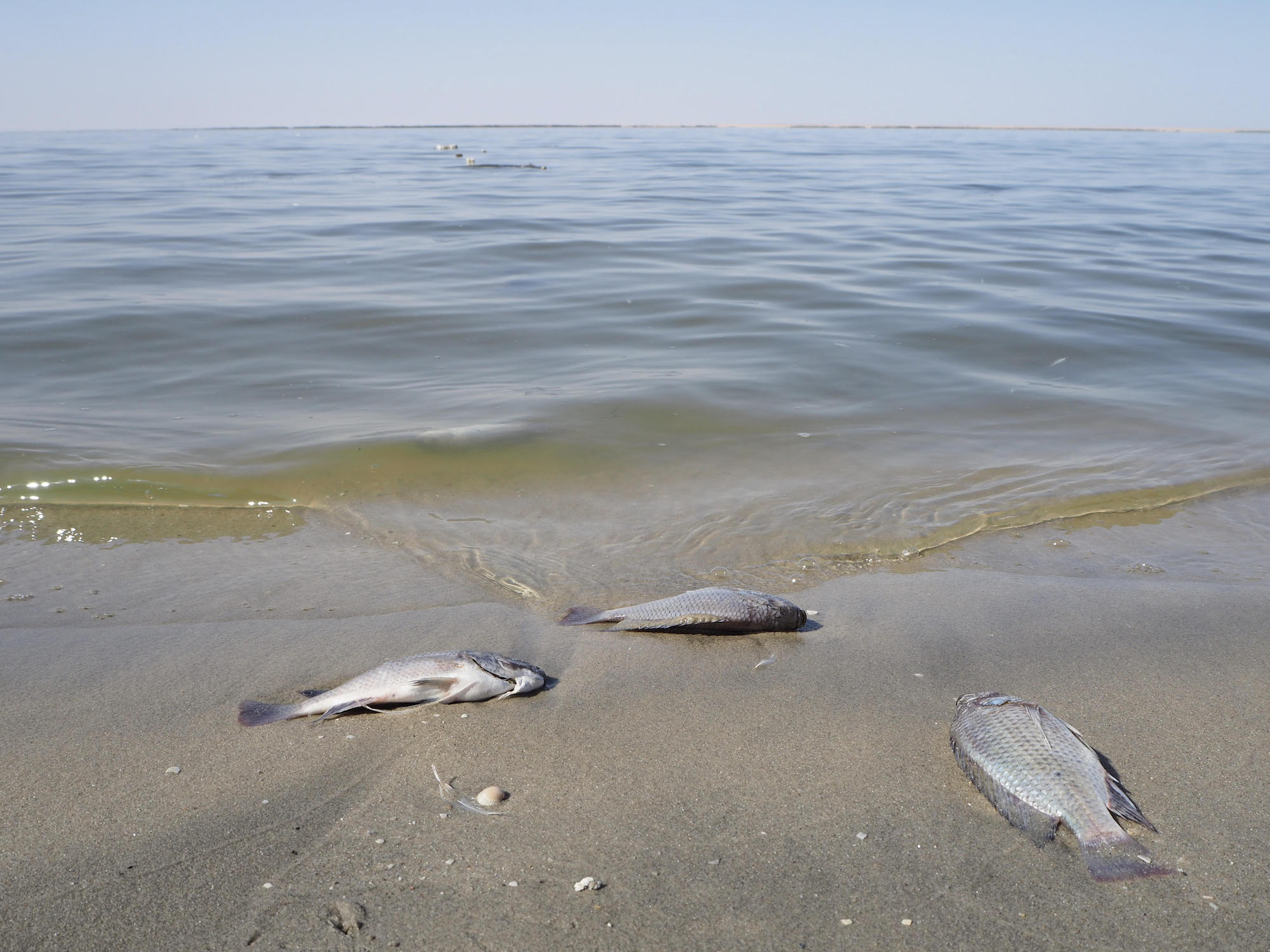
However, Abdullah explained that, in drought years such as 2021, the Ministry of Water Resources had to prioritise drinking water, maintaining river flows, and supporting agriculture.
With Iraq’s water supplies unable to meet current demand, and the country facing other water-related issues including poor sanitation and pollution, Lake Razzaza has been all but written off.
And with it, not only the lake’s diminished fish are under threat, but also its wider biodiversity.
Although a large community of pelicans could be seen bobbing on the lake, other birdlife is vanishing, with fisherman Aboud saying that annual flocks of migrant birds from Europe, usually seen at this time of year, were no longer in evidence.
Tourist attraction
Gloomy predictions about the lake’s complete demise have been around for years, with a 2011 report suggesting the lake could be dry within two years.
However, although it has shrunk from its previously recorded size of 1,562 square kilometres, Lake Razzaza currently endures at a considerable size and it remains a popular recreational site.
'According to our studies, unfortunately Lake Razzaza will dry out and eventually will be no more'
- Dr Aun Abdullah, consultant and acting spokesperson for Iraq’s Ministry of Water Resources
Families and visitors from nearby Karbala flock to the lake at weekends, to picnic on its shores or take leisurely boat trips out across its blue expanse.
“Karbala is basically a tourist city. Apart from during religious holidays, from most Thursday afternoons through to Saturday, many people come here,” says Aboud, who tells MEE that some of Lake Razzaza's former fisherman who abandoned their trade have now repurposed their boats for taking tourists on such trips.
Even those still fishing tap into this additional source of income at weekends, but the amount of money this generates is unreliable and insufficient for making a living.
“At the moment, we still make more money from fishing than from tourism because fishing is all week, but tourism is only at weekends,” explains Aboud.
First in line
The fishermen’s fear, if Lake Razzaza continues to shrink, is that eventually there will be neither fish nor tourism, and the lake will become just another piece of desert.
Their gloomy outlook might be partly rooted in truth. According to Abdullah, if Turkey’s upstream projects progressively reduce water flows into Syria and Iraq - not only to the Euphrates but also the Tigris - and if the region continues to be plagued by drought years, Razzaza might not be Iraq’s only lake under threat.
Under such circumstances, he said, Lake Habbaniyah (lying between Fallujah and Ramadi) and Lake Sawa (near Samawa) may also start to shrink.
Lake Razzaza, however, is first in line, and under Iraq’s current weather conditions and water shortages, Abdullah said there was little hope for the lake’s revival.
“Sometimes in the rainy season, some water comes from desert areas to the Razzaza depression but, unless the Euphrates floods, we can no longer give freshwater to the lake,” he said.
“According to our studies, unfortunately, Lake Razzaza will dry out and eventually will be no more."
Perfect Lebanese storm leaves refugees struggling to meet needs
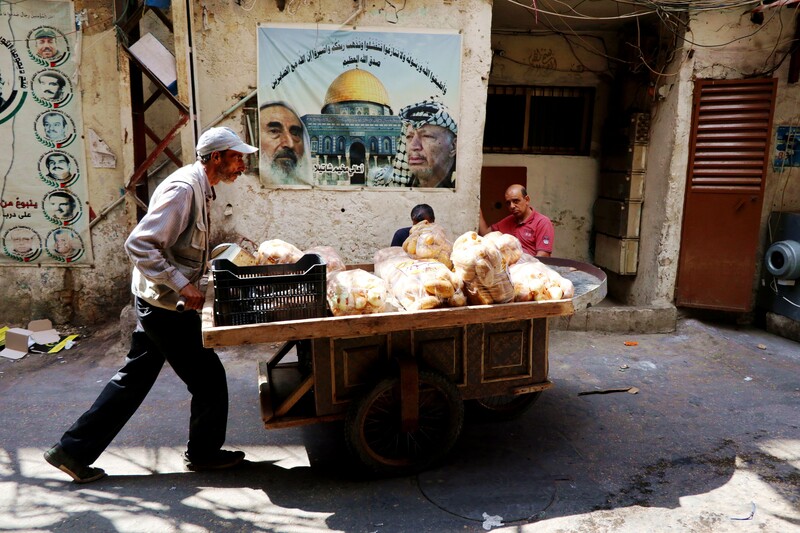
Palestinian refugees in Lebanon are struggling to meet basic needs amid a financial crisis, the COVID pandemic and UNRWA budget cuts.
Elisa GestriSIPA USADalal Yassine - 20 January 2022
Desperate and struggling to meet basic needs.
That was the verdict from Philippe Lazzarini, head of the United Nations Works and Relief Agency UNRWA, in December.
Lazzarini painted a stark picture of the situation for Palestinian refugees in Lebanon for whom, just this week, UNRWA launched a special appeal.
“I met young graduates whose only hope for a better future is to emigrate. They know the price of each migration route,” Lazzarini said. “I met parents who have nightmares about how they will afford to buy milk and diapers for their children the next day.”
Lebanon is grappling with a financial and political crisis that is afflicting everyone but is having a particularly devastating impact on the some 480,000 Palestinian refugees in the country, already among the poorest and most marginalized members of Lebanese society.
Compounding the situation, UNRWA – set up in the wake of the 1948 forced mass displacement of Palestinians from their homes and lands, the Nakba, to support refugees until such a time as they can return – is undergoing a critical budget crunch.
According to a Brussels conference in November, the agency was operating with a $60 million deficit in 2021.
As a result, UNRWA scaled back services across the region, causing protests and anger in the Gaza Strip, where the budget crunch is seen as an attempt to undermine refugee rights.
Decades of underfunding
UNRWA needs an annual budget of about $800 million to provide health, education, relief and social protection services in its five areas of operation: Lebanon, Syria, Jordan, the Gaza Strip, and the West Bank, including East Jerusalem.
At the Brussels conference, the agency secured donations of more than $600 million and reached an agreement with eight UN member states in which they committed to providing support for the next two to five years.
However, for 2022, even if all donations are realized, the agency has still only secured 40 percent of its budget.
And fully realized is the exception, not the rule. UNRWA’s budget is dependent on voluntary contributions. But donors have consistently failed to live up to their promised support. For decades, the agency has operated under the threat of suspended or reduced funding and political pressure.
The agency therefore has to be hypersensitive to the politics of donors and the broader international community, limiting its programs and further marginalizing Palestinian refugees.
Palestinian refugees in Lebanon are dependent on UNRWA for education, health and other social services. UNRWA has allocated roughly $125 million for its operations in Lebanon, but its dramatically reduced services do not meet the refugees’ basic needs. In December, Lazzarini acknowledged that the agency’s austerity measures had “reached its limit and is impacting the quality of our services.”
Yet even before the current crises, health services and infrastructure in many Palestinian camps were crumbling, aged and insufficient.
A perfect storm
More than 200,000 Palestinian refugees live in 12 overcrowded and dilapidated camps across the country. In addition, 29,000 Palestinian refugees from Syria have sought refuge in Lebanon since the outbreak of the Syrian conflict in 2011.
Last February, UNRWA reported that 87 percent of Palestinian families displaced from Syria to Lebanon live in poverty and are dependent on cash assistance.
However, the agency recently reduced its cash assistance program. Palestinian refugees from Syria previously received $100 per month per family as well as $25 per person per month in cash food assistance. They now receive cash assistance of $150 per family twice a year and $25 per person per month. After protests, UNRWA announced that they would provide a one-time cash payment of $75 per person.
These changes have been implemented even as rent and food costs have soared.
Indeed, the combination of the COVID-19 pandemic and Lebanon’s financial crisis has only deepened poverty among Palestinian refugees. According to UNRWA, nearly 75 percent of these refugees now live below the poverty line and suffer from food insecurity.
The collapse in the value of the Lebanese currency and skyrocketing conversion rates to the US dollar have also contributed to a decline in purchasing power.
This has been compounded by the work stoppage and closures related to the pandemic, daily power outages, and the lack of available food supplies, toiletries, medicine and fuel. After the Lebanese government lifted subsidies on basic necessities, food prices have risen uncontrollably. In September, the World Food Programme reported that the cost of its basic necessities food basket has increased fivefold in less than two years.
According to the UN Economic and Social Commission for Western Asia (ESCWA), the poverty rate in Lebanon has nearly doubled from 42 percent in 2019 to 82 percent of all Lebanese and non-Lebanese in 2021.
Ghada N. is a Palestinian refugee mother of four in Beirut’s Dahiyya suburb. Her family was not dependent on UNRWA’s programs before the current crises. They are now.
“At the beginning of the economic crisis we gave up on luxuries in case it continued for an extended period,” Ghada told The Electronic Intifada. “Now we are faced with giving up more and more basic necessities. There is no longer a middle class. Every Palestinian refugee needs help.”
The World Food Programme currently distributes food parcels to about 100,000 marginalized Lebanese families and monthly cash assistance to Syrian refugees.
By contrast, UNRWA only provides food and cash assistance on a quarterly basis to those Palestinian refugees it has determined are hardship cases. And over the past two years of the economic crisis and the pandemic, UNRWA has only provided emergency cash assistance twice. In May 2020, roughly $30 was provided to each Palestinian refugee in Lebanon.
In September 2021, UNRWA gave $40 to each Palestinian refugee child under the age of 18. Meanwhile, Palestinians have held demonstrations protesting cuts and calling on UNRWA to provide monthly support to all refugees. The Lebanese government is offering an assistance program to its citizens, but refugees are excluded.
Undermining health services
UNRWA’s health services have also been severely impacted by Lebanon’s collapse. After the Lebanese government lifted subsidies on medications, most refugees have been unable to afford their prescribed medicines.
UNRWA has also reduced benefits and the amount it contributes to cover the costs of hospital admissions, specialized surgeries, and laboratory and radiological tests. In addition, hospitals run by the Palestinian Red Crescent have been forced to reduce or halt their operations due to lack of fuel and electricity as well as shortages of medicine and equipment.
Samer Manna, a human rights advocate for Palestinian refugees in Lebanon, said the refugees’ precarious situation means they are dependent on cash-strapped organizations and charities as well as relatives abroad for financial assistance to receive medical care.
“In order to cover expenses for medical treatment, Palestinians are forced to wander endlessly through a maze of organizations, officials, and individuals and they are still unable to secure the required amount [for treatment],” he told The Electronic Intifada.
“Pursuing funds for medical expenses has become more painful than the illness itself.”
Meanwhile, COVID-19 vaccinations of Palestinian refugees have proceeded at a slow pace. The rate of vaccination among Palestinian refugees is less than those among Syrian and other refugees in Lebanon. By early January, less than a third of the total number of registered refugees received one dose of the vaccine and around one quarter have received a second dose. Just some 5,000 have received a third dose.
UNRWA’s primary and secondary school education has also suffered. Although UNRWA’s schools opened for the academic year, fear of infection has limited enrollment. Online schooling from home is not an option due to a lack of smart devices, Internet access and electricity. The percentage of students dropping out of school has increased the past two years as basic school supplies and transportation are no longer affordable. Some school-age children have been forced to find work as day laborers to help their families.
There is no solution in sight for Palestinian refugees in Lebanon. UNRWA’s emergency appeal is unlikely to alleviate the situation. Due to the increase in the number of refugees globally, UNRWA is now competing with other UN organizations as well as non-governmental organizations for funding. Supporting UNRWA and maintaining even the basic living standards of Palestinian refugees is no longer a priority for the international community.
And the agency is under constant pressure from the United States and Israel to reduce its services further, if not disband altogether.
Caught in the middle, as they have been since the 1948 Nakba, are the Palestinian refugees. Unable to return to their homes in Palestine or be treated with dignity and equality in Lebanon, they are at the mercy of the invisible threat of the COVID pandemic and economic and political forces beyond their control.
Dalal Yassine is a non-resident fellow at the Jerusalem Fund/Palestine Center in Washington DC. Twitter: @Dalal_yassine. The views in this article are those of the author and do not necessarily reflect those of The Jerusalem Fund and Palestine Center.
Subscribe to:
Posts (Atom)




